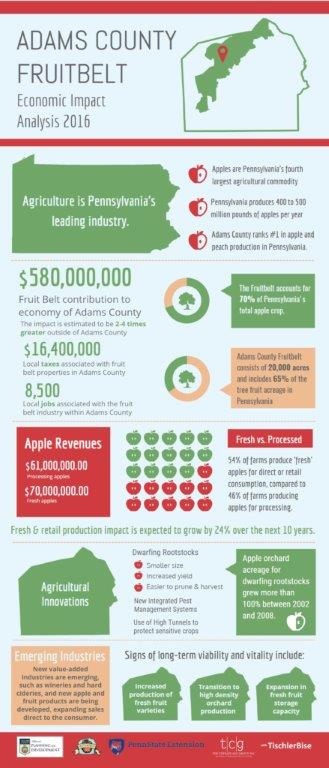By Robin Fitzpatrick
We often refer to Adams County’s three main industries as our pillars of industry—agriculture, tourism, and manufacturing. Within the county’s ag industry, we have long known that fruit is number one in production and is also the reason why value added processing and manufacturing businesses are located here. But we have not known the full extent and depth of our fruit belt’s economic impact—until now.
A comprehensive, two-year study just concluded, led by the Adams County Office of Planning and Development, in partnership with the Adams County Fruit Growers’ Association, the Penn State Extension Service, and conducted by The Chesapeake Group with TischlerBise.
“The Adams County fruit belt’s economic impact on the county’s economy is $580 million annually—and that’s a conservative estimate,” according to Bicky Redman, senior planner in the Adams County Office of Planning and Development. “Beyond that, the Adams County fruit belt’s economic impact on the state of Pennsylvania is two to four times that.” That translates into $1.16—$2.32 billion in economic activity.
 Additional major findings:
Additional major findings:
- $16.4 million in local taxes is generated by fruit belt properties
- Adams County’s fruit belt accounts for 70% of Pennsylvania’s total apple crop
- Adams County ranks #1 in apple and peach production in Pennsylvania
- 54% of Adams County’s fruit farms produce fresh apples for direct or retail consumption—with a value of $70 million annually
- 46% of Adams County’s fruit farms produce apples for processing—with a value of $61 million annually
- The economic impact of fresh and retail production is expected to grow by 24% over the next 10 years
- Statewide there are more than 31,000 acres producing fruit; more than 20,000 of those acres are located in Adams County
“Adams County’s fruit belt is very unique,” Redman says. “We might not have a fruit belt industry but for South Mountain. The taste of Adams County’s apples is relative to South Mountain and its well-draining soils, as well as the climate that it sets up.”
“Going a step further, Knouse Foods Cooperative might not have formed but for the fruit belt. We learned that 75% of the restaurants and institutions in the entire U.S. serve products from Knouse Foods.”
“We also learned how valuable the Penn State Fruit Research Lab is to Adams County and the industry as a whole. They are helping growers with innovations that will result in labor cost reductions. Labor is one of their major costs, and coupled with today’s immigration issues, it leaves our growers in a place of vulnerability and uncertainty,” Redman says, noting the industry is not without its share of issues.
Future economic impact studies could focus on the impact of Hanover Shoe Farms on the harness racing industry, Adams County’s poultry industry, dairy industry, and crop farming, says Redman.
At our Adams County Economic Development Corporation (ACEDC) Annual Membership Meeting in January, I declared 2017 “the year of the municipality.” As it pertains to agriculture, ACEDC is here to help our municipalities learn more about changes within the industry. Zoning, for example, may need to be reviewed to accommodate or restrict activities related to the production of a commodity. Think about how nice it might be to enjoy a glass of wine or cider while taking in a view that only Adams County can offer. This may be encouraged in one township and discouraged in another. There is no right or wrong; it’s just about planning what you want for your community. ACEDC is here to provide resources to municipalities so they can be prepared for these issues and questions as they arise or even before, as we all search for the right balance and blend of industry, preservation, services, housing, etc. that comprise Adams County as a whole.
Robin Fitzpatrick serves as President of ACEDC. For additional information, see acedc.org, call 717-334-0042, and follow the organization on Facebook, Twitter, and LinkedIn.





